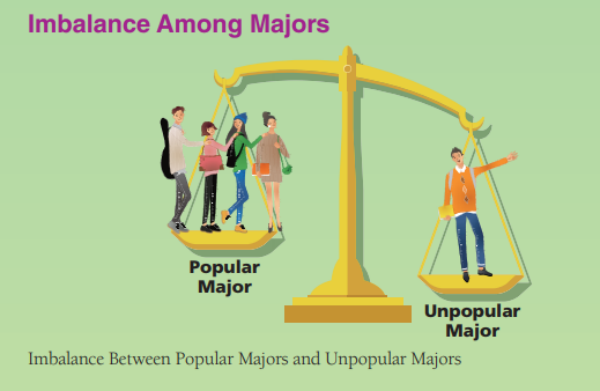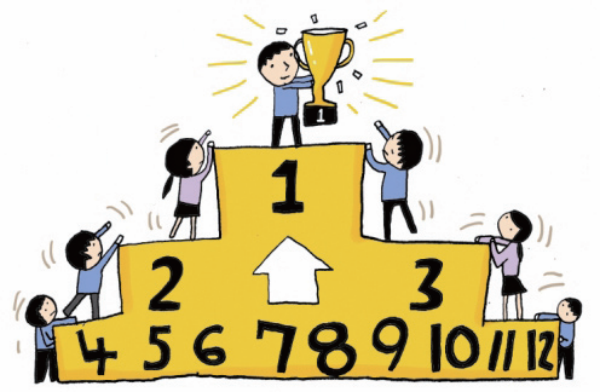As the spring semester has just begun, many Kingos might be excited about their new campus lives. This may be true especially for freshmen and sophomores who have just started to study on their majors. SKKU has an academic system different from other universities, the “academic unit system”. This unique academic framework has a huge impact on many Kingos’ school life, such as the selection of their major subjects. Therefore, the Sungkyun Times (SKT) now analyzes the limits of SKKU’s academic unit system and suggests possible directions for an improved system by examining those of other universities.
SKKU’s Academic Unit System
What is the Academic Unit System?
Under the academic unit system, students who enroll into a university belong to a department, instead of a specific major. A department is an integration of several related majors, and the students get to choose their majors within their departments afterwards. Its purpose is to offer students an opportunity to explore diverse majors and to encourage them to get a double major. This developed academic system is being operated in many universities in the United States (US), Japan, and Europe. For example, in the US, students under this system decide their majors at the end of their freshman or sophomore year. During their first and second year in a college, undergraduates take fundamental courses which are necessary for further study in the graduate school.
In Korea, the academic unit system was initially promoted by the government’s enforcement decree of the Higher Education Act in 1995. Shortly afterwards, many universities adopted the system, and SKKU adopted it in 1996 as well. The academic unit system, however, led to insufficient major education, and students started to feel like they do not belong to their majors. As a result, following the announcement of university autonomy in 2009, many universities returned to the previous system where each student enrolls into a university with a specific major.
Academic Unit System and its Achievements at SKKU
Although many other universities have abolished the academic unit system, SKKU is still operating the system. Under this unique system, most freshmen belong to one of the four departments: Humanities Science, Social Science, Natural Science, and Engineering. Freshmen who belong to these departments decide their majors at the end of their freshman year, and they start to study their majors in their sophomore year. The School of Business, Art, Pharmacy, and Medicine, the College of Education, and the Department of Architecture do not operate the academic unit system due to their certain academic characteristics.
There are several achievements of the academic unit system of SKKU. Above all, in terms of the admission, the school has increased its chance for admitting outstanding students by extending the unit of admission from major to department. When students applied for specific majors, there used to be a great gap in the applicants’ admission grades between popular majors and unpopular ones. After adopting the academic unit system and admitting students with a broader unit, however, students’ average admission grades have risen. Moreover, it turned out that the academic performance of freshmen also improved a lot because they needed to get a high Grade Point Average (GPA) in order to choose the major they want. Even if some of them have difficulty in deciding their majors, they have one year to explore diverse majors and think about what to major in. This exploratory educational environment encourages students to do a double major as well.
Limitations of SKKU's Academic Unit System
According to a survey of 150 Kingos from February 6th to 22nd, shortly after the to-be sophomores got results of their major assignment, only about one in four Kingos responded that they are satisfied with SKKU’s current academic unit system. This indicates that many students encounter difficulties within the school’s academic system.
Imbalance Among Majors

31% of the respondents pointed out that the biggest problem of SKKU’s unit system is the imbalance among majors. It means that there is a huge difference in the number of students applying for each major and that tacit ranking is formed along the majors. The imbalance occurs between majors due to the preference of the students on the majors based on the competitiveness of their majors in getting a job. Consequently, even when two different majors are available to the same number of students, the popular major ends up with more students applying than the possible capacity, leaving the unpopular one lacking students. Even after the majors are determined, the tacit ranking among majors leads to bias and discrimination towards students who chose the less popular majors. For instance, some assume the GPA of others and even evaluate whether they had studied hard or not in their first year merely by their majors. If this imbalance continues, it could eventually cause a collapse of the more unpopular majors.
A Weak Sense of Belonging
Since students do not belong to specific majors under the academic unit system, they feel a weaker sense of belonging within campus. This is true especially for freshmen who do not know where to make friends. In order to solve this problem, SKKU runs a special program called the Learning Community (LC). Most LC members, however, tend to tear apart as they choose different majors. Moreover, without majors, students have less opportunities to form a relationship with seniors who can provide practical information about campus life. For this reason, some of them expect to belong to a specific major when moving up to the second grade, but the situation does not get better. Even when students belong to a major, there are not enough programs for them to socialize with other students in the same major. For example, some majors do not even hold orientations for second-year students, who are actually beginners of the major. Therefore, under the SKKU’s academic unit system, a weak sense of belonging tends to last during the whole four-year campus life.
Major Assignment Dependent on GPA

During their winter vacation, SKKU sophomores-to-be ought to rank their preference among the majors of the department they belong to, and then their majors will be designated based on their ranking. Under the academic unit system of SKKU, however, the GPA of students Intense Grade Competition for Major acts as a key variable in major assignments, because students with higher grades will be prioritized if the number of students who selected a certain major exceeds the number to be assigned. Accordingly, even some students become unable to enter their desired major. According to the University College of SKKU, in this year’s major assignments, about 100 out of approximately 2,200 freshmen ended up with majors which were not their first preference. Actually, there might be more students who are not satisfied with their decided majors, given that there is a possibility of students changing their first choices considering their GPA. Those unsatisfied students have no choice but to struggle with the unwanted major for at least three years because changing a major is not allowed at SKKU. In order to avoid this situation and choose a major they want, freshmen naturally get into an intense competition for grades, which is genuinely stressful for them. That is, they would face the “entrance examination” once more for majors, right after taking the Korean College Scholastic Aptitude Test (CSAT) for college entrance. Another side effect of such competition is that many freshmen tend to take only easy courses for higher grades instead of a variety of courses. Consequently, the academic unit system fails to meet its original purpose which is to allow students to explore various majors before choosing the right one.
Insufficient Major Education
Under the academic unit system, many Kingos can take the major courses only for three years since their majors are decided, while other school students can focus on their major studies for four years. This may cause difficulties for students in developing a compact curriculum for their three-year study, since the total credit required for graduation has been reduced by half to one-third within the academic unit system. Although the reduction may encourage students to consider double majoring, it basically leads to insufficient major education. Another problem of the system is that most majors do not offer basic courses for students who have little background knowledge of their majors. This is especially true for students majoring in foreign language and literature; some of them ought to take conversation classes even though they have not learned how to speak the foreign language. Some among those students even take additional private education of their major “outside” the school.
Possible Directions for Improved Academic System
Exploring Majors Across Boundaries

According to a survey of 150 Kingos, about half of the respondents (48. 3%) answered that the biggest advantage of SKKU’s academic unit system is that Kingos get the opportunity to explore and choose their majors. Some respondents, however, said that opportunities and time offered in the first year are still not enough. Therefore, SKKU might need to improve its programs for major exploration, perhaps by benchmarking other universities’ efficient academic programs. Harvard University operates a well-organized interdisciplinary major exploratory system where all freshmen belong to Harvard College without any division of major or department. They are required to take general liberal arts lectures and advanced education courses in various fields. The purpose of the system is to enable the students to think flexibly by transcending disciplinary limits. After taking all the required liberal arts units, at the end of the third semester, students then choose their “concentration”, which is similar to a major, but can be changed by consulting with school directors.
Trans-disciplinary system of Daegu Gyeongbuk Institute of Science and Technology (DGIST) would be another fine example. Undergraduates at DGIST do not get a specific major for four years. Once they take mandatory courses in basic science and technology, humanities, and leadership until the second year, they can take diverse intersection required courses, which are like advanced courses in each field. Since their course choices are not bound by majors, students can take every course they want to study regardless of the major. As they graduate, students will get their bachelor’s degree of either convergence science or engineering, depending on the field they completed the required number of credits in.
Genuine Liberty to Study What Students Want
According to the survey, 36.9% of the respondents were not satisfied with SKKU’s academic unit system, and 22.1% of them thought that there is no advantage in it. Considering the students’ opinion to some extent, SKKU might need to consider abolishing the system and accepting students with specific majors. The school still would be able to offer students an opportunity to explore majors through the College of Liberal Studies. In fact, the College of Liberal Studies did exist at SKKU from 2009 to 2011, but it was only based on the Humanities and Social Sciences Campus and had three limited tracks: law school, graduate school, or the Public Administration Examinations. Despite its name, the college was not “liberal” at all, so it was abolished and changed to the School of Global Leader in 2012.
The College of Liberal Studies at Seoul National University (SNU), however, has been successfully operated so far. At SNU, while other freshmen enroll into the school with specific majors, about 120 students enter the College of Liberal Studies without any decided major. They belong to the college, where interactions with professors and other students are frequent, so that the students can feel a strong sense of belonging. They study together not only basic studies that include humanities, sciences, and engineering, but also the special courses for exploring majors across different boundaries. Students can choose their majors at the end of their second year in all departments except the College of Medicine, Nursing, Pharmacy, Veterinary Medicine, Education, and the School of Law. That is, SNU’s College of Liberal Studies truly respects the liberty of students to choose and explore majors.
Several unsolved problems have existed in an academic unit system of SKKU, but little improvement has been made so far, since it was promoted for the first time in the 1990s. Given that the secondary education system is continuously changing to include the integrated study, maybe it is the right time for SKKU to modify its academic systems correspondingly.
